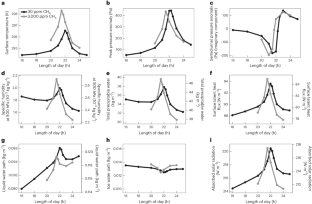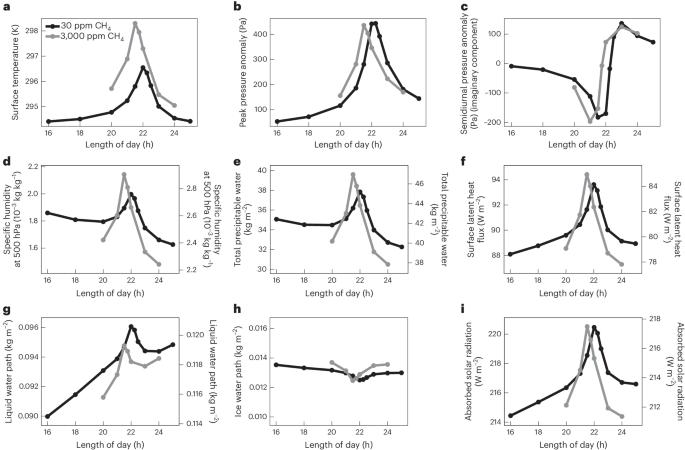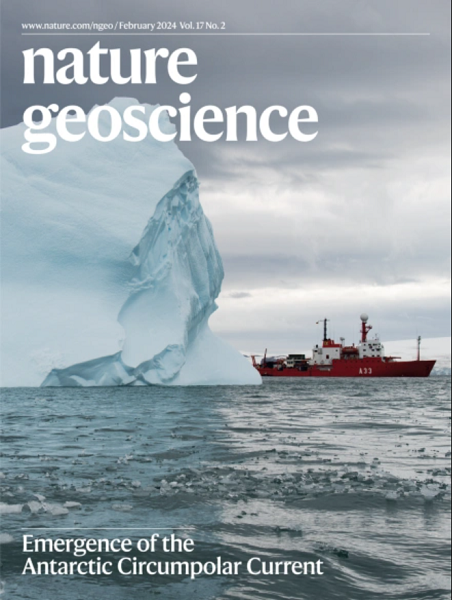Past Earth warmed by tidal resonance-induced organization of clouds under a shorter day
IF 15.7
1区 地球科学
Q1 GEOSCIENCES, MULTIDISCIPLINARY
引用次数: 0
Abstract
Solar heating causes the periodic expansion and contraction of Earth’s atmosphere known as the atmospheric tide. This is observed at the surface as a semidiurnal pressure oscillation that appears to influence convection and rainfall. Roughly 0.5 to 1.0 billion years ago, when day length was roughly 21–22 hours, the tide would have been resonant, or close in frequency, with atmospheric Lamb waves of 10.5–11.0 hour periods. This ‘Lamb resonance’ would have amplified the pressure oscillation, perhaps strongly enough to affect the global or tropical climate. Here we run a general circulation model at different rotation rates to model the resonance and its impact on climate. The resonance exerts a dominant control on tropical cloud cover, convection and rainfall: sunrise and sunset are cloudy and rainy, whereas midday and midnight are clear and dry. Generally clear skies at noon lower the albedo, contributing 2–4 K warming in the global average, which would have helped counter the 10% fainter Sun. The hydrological cycle becomes more active, and the atmosphere moister. Our work highlights the role of tidally induced adiabatic expansion in controlling tropical precipitation, helping explain modern-day observations of a semidiurnal rainfall pattern. Climate simulations suggest atmospheric tides in resonance with atmospheric waves on early Earth when days were shorter could have modified tropical convection patterns and warmed the planet despite a fainter Sun.


在日照时间较短的情况下,潮汐共振引起的云层组织使过去的地球变暖
太阳加热会导致地球大气的周期性膨胀和收缩,这就是所谓的大气潮。在地表可以观察到这种半周期性的气压振荡,它似乎会影响对流和降雨。大约在 5 到 10 亿年前,当昼长大约为 21-22 小时时,潮汐会与周期为 10.5-11.0 小时的大气兰姆波共振或频率接近。这种 "兰姆共振 "会放大气压振荡,也许会强烈到足以影响全球或热带气候。在这里,我们以不同的自转速率运行一个大气环流模型,以模拟共振及其对气候的影响。共振对热带云层、对流和降雨起着主导控制作用:日出和日落多云多雨,而正午和午夜则晴朗干燥。一般来说,正午晴朗的天空会降低反照率,使全球平均气温升高 2-4 K,这将有助于抵消太阳变暗 10%的影响。水文循环变得更加活跃,大气也更加湿润。我们的研究强调了潮汐引起的绝热膨胀在控制热带降水方面的作用,有助于解释现代观测到的半日降水模式。
本文章由计算机程序翻译,如有差异,请以英文原文为准。
求助全文
约1分钟内获得全文
求助全文
来源期刊

Nature Geoscience
地学-地球科学综合
CiteScore
26.70
自引率
1.60%
发文量
187
审稿时长
3.3 months
期刊介绍:
Nature Geoscience is a monthly interdisciplinary journal that gathers top-tier research spanning Earth Sciences and related fields.
The journal covers all geoscience disciplines, including fieldwork, modeling, and theoretical studies.
Topics include atmospheric science, biogeochemistry, climate science, geobiology, geochemistry, geoinformatics, remote sensing, geology, geomagnetism, paleomagnetism, geomorphology, geophysics, glaciology, hydrology, limnology, mineralogy, oceanography, paleontology, paleoclimatology, paleoceanography, petrology, planetary science, seismology, space physics, tectonics, and volcanology.
Nature Geoscience upholds its commitment to publishing significant, high-quality Earth Sciences research through fair, rapid, and rigorous peer review, overseen by a team of full-time professional editors.
 求助内容:
求助内容: 应助结果提醒方式:
应助结果提醒方式:


